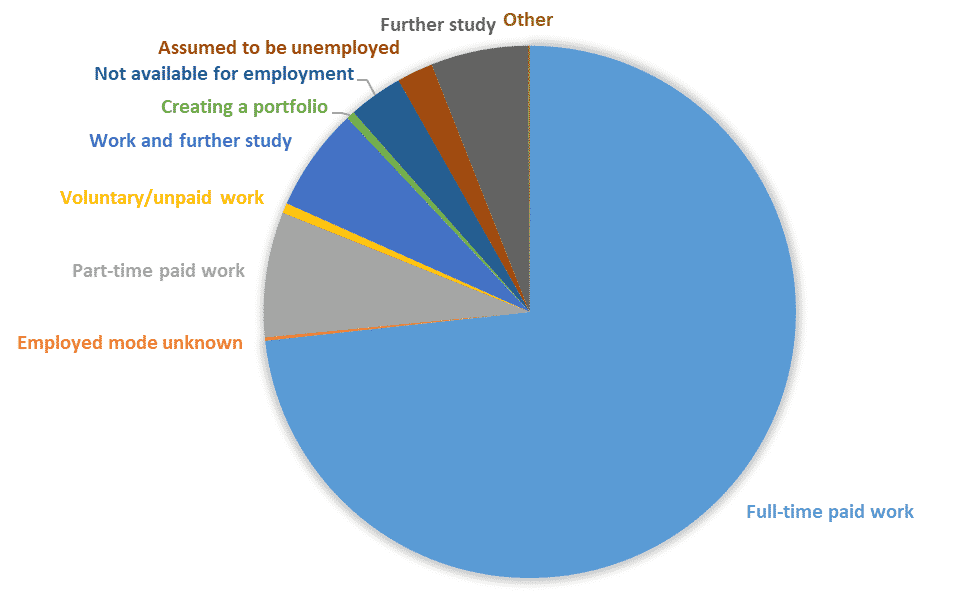Introduction
This article will answer “what can you do with a PhD in Sociology?”. First, let’s start with the basics: Sociology is a social science which aims to understand the behaviour of society. This is a very broad definition but captures the essence of the subject. Sociology studies range from the structure of different groups and organisations within society to divisions from religion, class, race, age and gender.
A PhD degree in sociology provides insight into social concepts and requires a strong understanding of research methods, statistics, data collection and analysis. Research shows that most Social science graduates move into academia, though other (non-academic) career options exist.
Data on leavers
The Destinations of Leavers from Higher Education Longitudinal Survey, carried out by HSEA, captures information about the activities and perspectives of graduates three and a half years after they completed their studies. Based on over 11,000 responses from 2012/13 Social study leavers, approximately 83% of UK domiciled leavers who achieved a qualification through postgraduate research were in work, with another approx. 7.5% in further study.

Destinations of 2012/13 UK and other EU domiciled leavers with postgraduate research in Social studies.
More information on this data can be found here.
The same survey also includes information on those in employment. The table below presents the employment destination (categorised by jobs) of UK domiciled Social study leavers (2012/13) who obtained postgraduate qualifications.
| Standard Industrial Classification of employer | Percentage |
| Agriculture, forestry and fishing | 0.00% |
| Mining and quarrying | 0.00% |
| Manufacturing | 1.10% |
| Electricity, gas, steam and air conditioning supply | 0.60% |
| Water supply, sewerage, waste management and remediation activities | 0.10% |
| Construction | 0.60% |
| Wholesale and retail trade; repair of motor vehicles and motorcycles | 1.10% |
| Transport and storage | 0.80% |
| Accommodation and food service activities | 0.40% |
| Information and communication | 2.60% |
| Financial and insurance activities | 3.00% |
| Real estate activities | 1.00% |
| Professional, scientific and technical activities | 9.70% |
| Administrative and support service activities | 1.20% |
| Public administration and defence; compulsory social security | 26.50% |
| Education | 18.50% |
| Human health and social work activities | 28.70% |
| Arts, entertainment and recreation | 0.80% |
| Other service activities | 2.50% |
| Activities of households as employers; undifferentiated goods- and services-producing activities of households for own use | 0.00% |
| Activities of extraterritorial organisations and bodies | 0.50% |
| Not known/Not applicable | 0.30% |
UK domiciled leavers (Postgraduate Social studies 2012/13) in employment (inc. work and further study) by Standard Industrial Classification of employer
More information on this data can be found here.
We can see the largest four destinations are: 1) Human health and social work activities, 2) Public administration and defence; compulsory social security, 3) Education and 4) Professional, scientific and technical activities. We can also see that some social study graduates take up jobs/roles in financial and insurance activities, retail trade and manufacturing.
Of course, a postgraduate degree is much more specialised than an undergraduate degree, and so your PhD programme can be tailored to particular career options if you already have long-term aspirations for your career. For example, a PhD in Sociology with a focus on international relations lends itself to a career in international politics.
Studying sociology equips you with the skills for a career not only in the academic field but also in a wide range of fields including business, health & social care, marketing, public relations, education and politics. Examples of typical first roles post-graduation for sociology doctorates includes lecturers, researchers, positions in government, youth workers and public health services.
Business
The analytical nature of sociology studies lends itself to a career in business. Business is a very broad term – think statistics, public relations, human resources etc. The ability to emphasise and understand human behaviour is important in the last two examples, and business often looks to sociology students at university for these attributes. Due to the competitive nature of business jobs, PhD students should look to undertake work experience which would support their academic work before applying.

Marketing
Marketing is the art of understanding social behaviour and human thinking to best develop campaigns to target these attributes. A PhD degree in sociology provides a strong foundation of knowledge in gender, race, age and human behaviour etc. which enables you to use your research skills to more accurately forecast the effectiveness of marketing campaigns to target demographics. This understanding, combined with the analytical skills gained from a PhD makes a career in marketing a suitable destination for sociology graduates.
Social & social care
Social researchers are able to transition into social care roles such as community development officers, welfare officers, counsellors as well as careers in the public health service, the criminal justice service and in rehabilitation. These roles let you make the most of the ‘human’ side of your research programme and allow you to interact with members of the public (from varying backgrounds) in a more intimate nature. If you are a student who particularly enjoyed the health oriented aspects of your PhD study, this could be the right career path for you.
Education
A Sociology PhD degree can prepare you in a career in education at any level. As a research student you are likely to have knowledge of child behaviour and the learning process in children which can be used (alongside a professional teaching qualification) to land you a teaching role in primary and secondary education.
In terms of higher education, a research degree typically forms part of the entry requirements for a teaching role in universities. Generally, university lecturers have much more freedom in the contents and coursework of their course than lower education teachers, which allows you to focus on your chosen speciality and tailor research training to your research interest. Universities often offer their doctorates part time teaching positions as a way of assisting in the transition from student to teacher.
It is important to note that an educational role in higher education is not just limited to lecturing at a university, but also includes supervising research projects, tutoring students and running research programmes.

Politics
Similar to marketing, a successful politician needs to have a strong understanding of social culture and be in tune with the values of different demographics. A career in politics can range from being an activist to engaging with charities, regardless of the level of involvement – a PhD in sociology gives you the perspective of different cultures and can allow you to use this insight to contribute to society. Whether your postgraduate research area is directly related to politics or not, looking for work experience is advised as it often forms part of entry requirements for political roles.
Finding a PhD has never been this easy – search for a PhD by keyword, location or academic area of interest.
Skills for your CV
It is important to remember that whilst most Sociology doctorates pursue a career in academia, holding a PhD in the subject gives you a number of skills and attributes which make you desirable to a wide range of employers. You must be able to recognise these skills when preparing your CV and job applications.
Examples of skills you will learn as a sociology PhD student during your postgraduate study include:
- An understanding of the social concepts and current issues faced in society,
- The ability to emphasise and use information to make strong arguments,
- An understanding and application of statistical methods and analytical techniques,
- Appreciate the diversity and range of cultures in the world,
- Use the above knowledge to become more influential in society and relate your knowledge to public policy.
In addition to the above having a PhD also equips you with several transferable skills. These are skills which a vital in the professional working environment and can be used in any sector. Examples of transferable skills postgraduate research students possess include communication, team working, work ethic, time management, problem-solving and the ability to carry out independent research.
